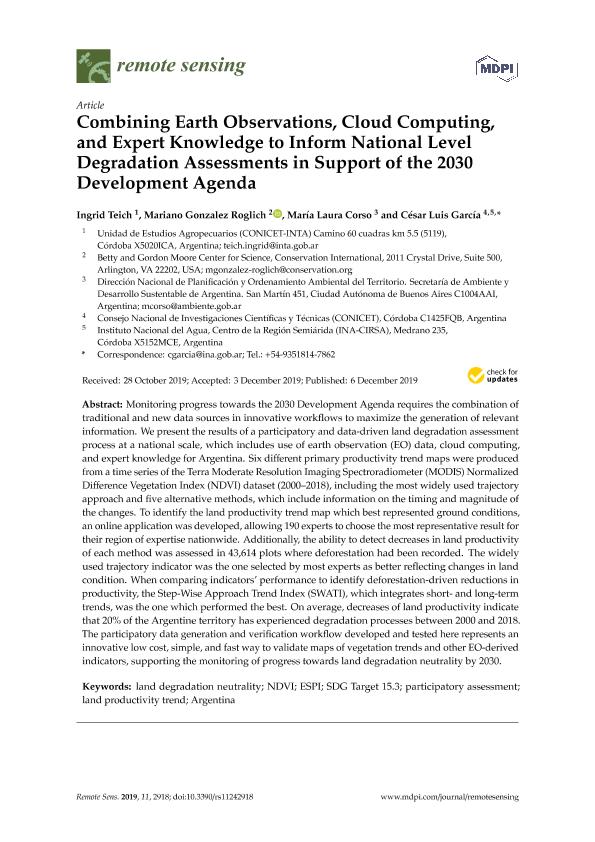Artículo
Combining earth observations, cloud computing, and expert knowledge to inform national level degradation assessments in support of the 2030 development agenda
Fecha de publicación:
06/12/2019
Editorial:
Multidisciplinary Digital Publishing Institute
Revista:
Remote Sensing
e-ISSN:
2072-4292
Idioma:
Inglés
Tipo de recurso:
Artículo publicado
Clasificación temática:
Resumen
Monitoring progress towards the 2030 Development Agenda requires the combination of traditional and new data sources in innovative workflows to maximize the generation of relevant information. We present the results of a participatory and data-driven land degradation assessment process at a national scale, which includes use of earth observation (EO) data, cloud computing, and expert knowledge for Argentina. Six different primary productivity trend maps were produced from a time series of the Terra Moderate Resolution Imaging Spectroradiometer (MODIS) Normalized Difference Vegetation Index (NDVI) dataset (2000-2018), including the most widely used trajectory approach and five alternative methods, which include information on the timing and magnitude of the changes. To identify the land productivity trend map which best represented ground conditions, an online application was developed, allowing 190 experts to choose the most representative result for their region of expertise nationwide. Additionally, the ability to detect decreases in land productivity of each method was assessed in 43,614 plots where deforestation had been recorded. The widely used trajectory indicator was the one selected by most experts as better reflecting changes in land condition. When comparing indicators' performance to identify deforestation-driven reductions in productivity, the Step-Wise Approach Trend Index (SWATI), which integrates short- and long-term trends, was the one which performed the best. On average, decreases of land productivity indicate that 20% of the Argentine territory has experienced degradation processes between 2000 and 2018. The participatory data generation and verification workflow developed and tested here represents an innovative low cost, simple, and fast way to validate maps of vegetation trends and other EO-derived indicators, supporting the monitoring of progress towards land degradation neutrality by 2030.
Archivos asociados
Licencia
Identificadores
Colecciones
Articulos (UDEA)
Articulos de UNIDAD DE ESTUDIOS AGROPECUARIOS
Articulos de UNIDAD DE ESTUDIOS AGROPECUARIOS
Articulos(CCT - CORDOBA)
Articulos de CTRO.CIENTIFICO TECNOL.CONICET - CORDOBA
Articulos de CTRO.CIENTIFICO TECNOL.CONICET - CORDOBA
Citación
Teich, Ingrid; González Roglich, Mariano; Corso, María Laura; García, César Luis; Combining earth observations, cloud computing, and expert knowledge to inform national level degradation assessments in support of the 2030 development agenda; Multidisciplinary Digital Publishing Institute; Remote Sensing; 11; 24; 6-12-2019; 1-20
Compartir
Altmétricas




